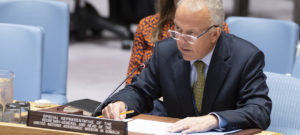Briefing the Security Council for the last time in his capacity as UN Special Representative for Somalia, Michael Keating called on all Somalis to draw strength from the positive transformations going on inside the country and work collectively for the common good.
“The future of Somalia is in the hands of the Somalis,” he declared.
In particular, Mr. Keating – who also heads the UN Assistance Mission in Somalia (UNSOM) – urged unity among political leaders.
“The more [they] show unity, the greater the opportunity, and the responsibility, of international partners to invest in all parts of the country and its leadership,” he said.
In his remarks, Mr. Keating highlighted four key concerns the country’s leaders need to address, and issues that the international community should keep focusing on.
These include the threat posed by the Al Shabaab and other extremist groups; the risk of political differences overshadowing progress in legislative, reform and security areas; fragmentation within the international community; and the danger of a humanitarian “catastrophe”, especially with most of the population already living in precarious circumstances due to climate change and other vulnerabilities.
“Future crises will result from the combination of climate related shocks; armed conflict provoked by Al Shabaab and unresolved grievances; competition over natural resources; and systemic marginalization of certain groups,” warned Mr. Keating. He underscored the need to reduce the vulnerability faced by ordinary Somalis, through job creation and smart investments that safeguard natural resources and help unlock the enormous economic potential of the country.
Besides political will, Mr. Keating underscored, success will depend on leaders from the political, business and traditional spheres “working together for the common good, leveraging the country’s potential wealth to transform prospects for people – especially the young.”
On 1 October, Nicholas Haysom will replace Mr. Keating as the Special Representative of the Secretary-General for Somalia and the head of UNSOM. Mr. Keating was appointed the top UN official in the Horn of Africa nation in November 2015.
Women have brought ‘important voices’ to Somali politics
Alongside Mr. Keating, Phumzile Mlambo-Ngcuka, the Executive Director of the UN gender equality and empowerment agency for women and girls (UN Women) highlighted the “once-in-a-generation opportunity” that Somalia currently has to establish lasting peace, and gender equality.
She commended the nation for improving representation of women in public office, illustrated by the “jump” in women’s representation in parliamentary elections from 14 to nearly 25 per cent of seats in the most recent elections.
This progress, she underscored, has brought many “important voices” to Somali politics.
She said it had brought to the centre “the fight to end child marriage, end female genital mutilation (FGM), and change laws that discriminate against women,” noting that the participation of women will be further boosted if more leaders, especially clan leaders, embrace gender equality and support women.
She also called on the international community and the Security Council to support Somalia’s federal and provincial authorities, advance gender equality, act strongly against sexual and gender-based violence, advocate for meaningful participation and recognition of women in all sectors, and support women’s groups in the country.
“Women’s organizations in Somalia are organized. They are dedicated to their country: they are activists, advocates, entrepreneurs, professionals, and patriots,” said Ms. Mlambo-Ngcuka, noting that as the country prepares to confront the challenges in the days ahead, “women will make the difference.”
UN.org







































